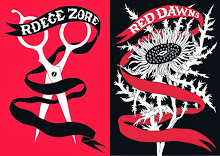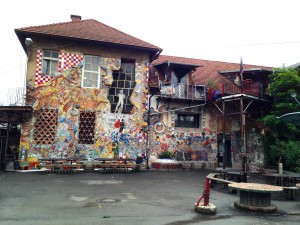Feminist festivals are everywhere! In the summer of 2014 I was able to meet up with Ana Grobler and Tea Hvala, two organizers of Red Dawns / Rdeče Zore, an international feminist and queer collective/festival happening annually since 2001 in Ljubljana, Slovenia. The festival attracts artists and activists from the Balkan region and wider Europe and is a testament to the radical rabblerousing underway in the region. Similar to festivals like Ladyfest (global), Antifee (Germany), and Edgy Women (Canada), Red Dawns is a venue that supports cultural activism in Slovenia and the region (http://rdecezore.blogspot.com http://www.rdecezore.org/).
The first Red Dawns festival in 2000 emerged from the collaborative work of feminist and lesbian activists. Their work was part of a tradition of autonomous organizing in the former Yugoslavia in the 1970s and 80s as well as the rise in DIY feminist and queer festivals across Europe. Specifically, Red Dawns evolved out of a movement to take over the former military space on Metelkova street in Ljubljana. After independence from Yugoslavia in the early 1990s, artists and activists squatted in the space until they successfully transformed it into an autonomous cultural center. Like other associations that emerged from the squatting of Metelkova, Red Dawns is part of KUD Mreža (Kulturno umetniško drustvo Mreza), a formal cultural-artistic association. Metelkova is now a permanent (sanctioned) space that houses galleries, artist studios, alternative music venues, independent publishers and non-governmental organizations. It is also a meeting area for countercultural gatherings, from traveling anarchist to the annual Red Dawns festival.
Metelkova is a porous space rather than a place of collective identification. This form mirrors Red Dawns, given the diverse perspectives and fluid meanings of feminist and queer linked to it. For example, the name Red Dawns alludes to the militant feminist group Rote Zora (Red Zora) active from 1977-1995 in West Germany. They bombed numerous sex shops, cars, corporations and government offices to challenge patriarchal society. Red Dawns does not advocate violence, but draws transnational inspiration from the group due to longstanding German-Slovenian cross-cultural influences as well as a connection to countercultural feminist activism. As a side note, Rote Zora is no longer active. In fact, in 2007 one of its former members turned herself in, wanting a “quite life” after living in exile. (http://womensenews.org/story/the-world/070813/germanys-once-violent-feminist-adopts-quiet-life#.VBmm1kuBlZw). While Red Dawns member Tea Hvala was clear about their distinction from Rote Zora, she also explained that there was no “one” feminist perspective in the group. This is also evident in the mishmash of participants who gather yearly on March 8th – a date used to commemorate and reinterpret International Women’s Day – for feminist consciousness raising, expression and collaboration.
I asked Tea and Ana how they came to work with Red Dawns. They cited their creative work as a path to feminist organizing. Tea had been involved in the zine and punk music scene and later took up art and literature in school. Ana was a student studying feminist art in Slovenia. Their creative work and political consciousness drew them to Metelkova and Red Dawns – something that is evident along the walls of the autonomous space (see images above). Tea’s involvement tracks back to the early 2000s. She also took on archiving the festival in published essays, interviews and a MA thesis in gender studies. Although no longer an organizer, her legacy is clearly present, as with her edited volume Rdečke razsajajo!, a collection of interviews with the organizers of Red Dawns. In Ana’s discussion of her more recent (since 2009) experiences with the festival, she explained that the all-volunteer aspect of the project is quite intense. With uncertain funding sources for the festival and greater economic pressures on artists in Slovenian society, the labor of putting on the event can be taxing. It is a testament to the commitment and creative vibrancy of the organizers/collaborators that the festival is ongoing despite reduced state support and international donor support.
The question of how to make art and creative work your life (and sustain yourself), was one I heard from others as well during my time in Ljubljana. Indeed, for some local artists Metelkova is out of reach because it no longer is a fluid space. Its residents simply do not leave and thus new people can’t get in. Because there is nowhere else to go, the studios remain static. In an attempt to claim space in neoliberal Ljubljana, some have rallied to create new squatter’s areas in the city. While the Slovenian government supports the arts – it is certainly good for developing a creative and tourist economy – artists still struggle for space and livelihoods in Ljubljana. Tea and Ana also talked about this struggle in the context of their lives and their relationship to Red Dawns.
Within this context of Ljubljana, Red Dawns has made itself into a cultural institution. One of the things I find most exciting about the Red Dawns festival is that it is not self-contained, but a venue for critical feminist and queer engagement. It brings in and gives stage to counter-cultural work across the region. It may be, as Tea explained when we talked, that Red Dawns has more of an international than national reputation. Thus, Red Dawns exceeds the boundaries of a community of organizers. It embodies a practice of engagement and is an index of a thriving cultural activist scene. I’ve clearly only scratched the service.




